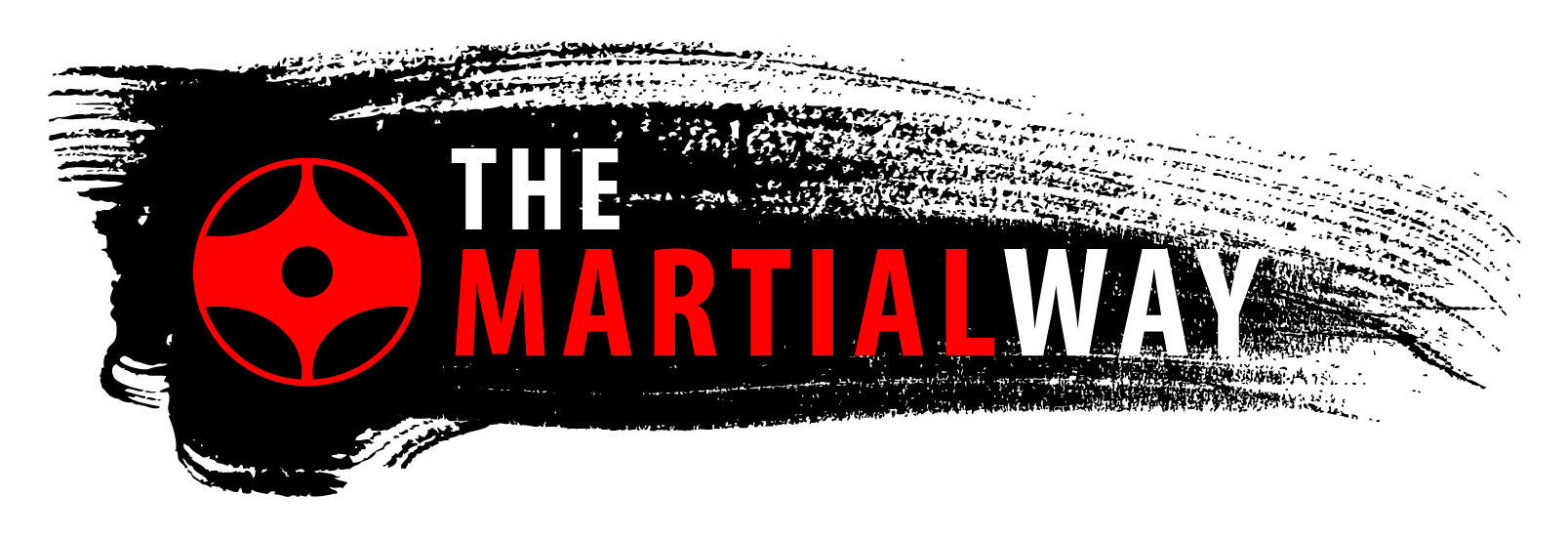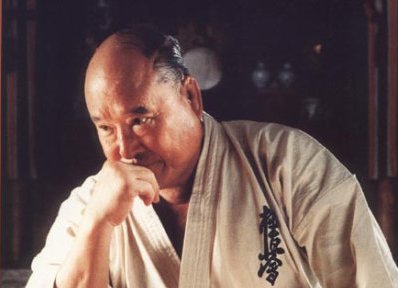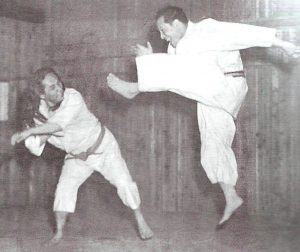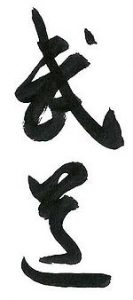 What differentiates Kyokushin Karate from sport? We were reminded of this by Sensei Steve Fogarasi. Everyone is enjoying the beautiful new dojo and home for Contact Kicks Martial Arts, all the athletic equipment and atmosphere. However, it is still a dojo and place of not only of physical practice, but of bettering ourselves as humans.
What differentiates Kyokushin Karate from sport? We were reminded of this by Sensei Steve Fogarasi. Everyone is enjoying the beautiful new dojo and home for Contact Kicks Martial Arts, all the athletic equipment and atmosphere. However, it is still a dojo and place of not only of physical practice, but of bettering ourselves as humans.

Sensei Steve takes us through out paces in preparation for sparring, including rounds on the thai pads, foot-work drills, etc. We then move into sparring. This is where our spirit is tested, as the rounds continue and the warmth of the spring evening hits you. Your body tenses in involuntary preparation of being struck, while you work against the mind to relax. Ignoring the pain of a gedan mawashi-geri that you weren’t prepared for. By the end, we are all exhausted and spent, but there is also a feeling of adulation.
As we sit and regain our composure on the mats, Sensei talks talks about the importance of the right mindset. He poses the question, what is Karate? What is the difference between karate and sport? While closely related, obviously, due to the physical conditioning aspects, what differentiates Kyokushin Karate from sport, he tells us, is the aspect of Budō.
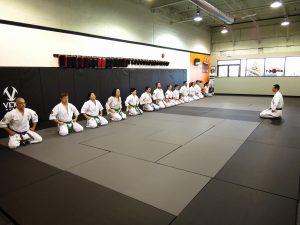 Budō literally translated is “Way of War” or The Marital Way. Budō is a compound of the root bu (武), meaning war or martial; and dō (道), meaning path or way. It’s in essence the modern rendition of Bushido (武士道); literally “the way of the warrior”.
Budō literally translated is “Way of War” or The Marital Way. Budō is a compound of the root bu (武), meaning war or martial; and dō (道), meaning path or way. It’s in essence the modern rendition of Bushido (武士道); literally “the way of the warrior”.
Bushido was a way of life for the Samurai (warrior class of feudal Japan). This included a code of ethics and disciplines that shaped the way a Samurai should live. Though there are no more samurai, the ethics and standards still live on in the teachings of various schools of martial arts. Budō is the discipline associated with martial arts that shape the way a true martial artist (Budō-ka; 武道家) should live. Budō refers to a way of life, led by those who practice martial arts.
This is extremely important for young students, as it is the building blocks of integrity, honesty, empathy, leadership, and responsibility. It naturally builds confidence in a young person.
Like honing a sword, we are honing our spirit along with our bodies. Sensei tells us that by respecting the Etiquette of the dojo we are furnishing the noble qualities of the soul, which distinguishes Kyokushin Karate from sport, and the budō-ka from an an average athlete. It isn’t just about being able to do an exercise or to fight. It is about doing so with attention to detail. With respect not only given to your fellow martial artist, but to yourself and the environment around you. About striving to be the best you can be.
Though Kyokushin Karate may not be descended from Samurai, Karate is descended from nobility, of both Bushidō, and Budō.
According to the karate master Gogen Yamaguchi:
“Budō did not originate in a peaceful atmosphere. It was necessary to protect one’s life at the time, and to learn how to use Budō as a weapon and achieve one’s responsibility as a warrior. It was the warrior’s duty to develop spirit. … It was necessary to obtain a technique to protect oneself, and one had to have a strong spirit to correspond to that. When one could overcome a conception of death, there was an improvement of a human being as a Samurai. When it was developed, karate-do was used in place of weapons and studied that way, so that the spirit of the Samurai was needed at the beginning of its conception to learn karate.”
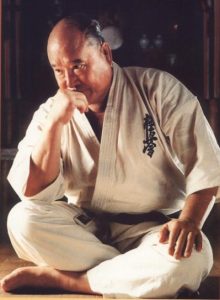 Masutatsu Oyama, the founder of Kyokushin Karate, always described Kyokushin Karate as Budō Karate, a path toward self-perfection though the practice of the martial art, and had this to say about the subject:
Masutatsu Oyama, the founder of Kyokushin Karate, always described Kyokushin Karate as Budō Karate, a path toward self-perfection though the practice of the martial art, and had this to say about the subject:
“Karate is the most Zen-like of all the Martial Arts. It has abandoned the sword. This means that it transcends the idea of winning and losing to become a way of thinking and living for the sake of other people in accordance with the way of Heaven. Its meanings, therefore, reach the profoundest levels of human thought.
For a long time, I have emphasized that karate is Budō, and if the Budō is removed from karate, it is nothing more than sport karate, show karate or even fashion karate – the idea of training merely to be fashionable.
Karate that has discarded Budō has no substance. It is nothing more than a barbaric method of fighting or a promotional tool for the purpose of profit. No matter how popular it becomes, it is meaningless.”
Like all lessons this one too is applicable to life. It reminded me to be mindful outside of the dojo. To take pride in everything I do, and look at it like a justu (術), literally meaning: skills/techniques. Even writing this blog, because of Sensei Fogarasi, I now look at differently. I look at it like a jutsu, or skill, that I must respect and build upon. I want to pass on the knowledge I am learning while bettering myself, and I can do this with my writing. It is an another manifestation for me, of Budō.
I am so proud of my dojō, and can’t believe how fortunate we are to have a facility in the Greater Toronto Area of Vaughan that teaches a true Martial Way, under the direction of a modern warrior. Sensei Steve Fogarasi.
